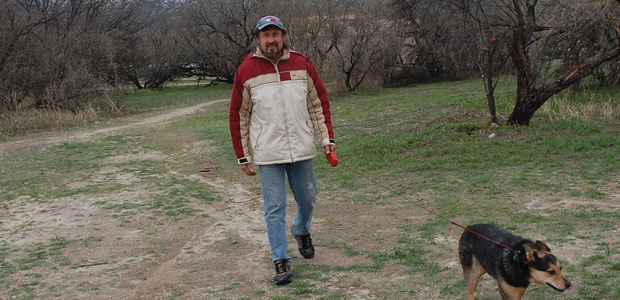Advertisement
Cancer has Many Stories
Four tales of healing

Cancer is just a word; it’s not a sentence. Interviewing four people who’ve taken this phrase to heart was a humbling, inspiring experience.
These are ordinary people; survivors who have faced a fearful disease, who’ve made decisions, who’ve learned a lot—about cancer and about themselves— and have had their lives changed in bountiful ways.
Conquered fear
For Mike Konkin, 67, a retired teacher in Vancouver, the diagnosis of moderately aggressive prostate cancer didn’t stop him from backpacking across Australia with his daughter in 2004.
Surgery was suggested, but he held off on making a rapid decision. Under the guidance of a naturopathic oncologist, Mike changed his diet and lifestyle drastically. Intravenous vitamin C and various supplements were also part of his protocol.
His conventional oncologist at the time couldn’t believe it when more tests revealed that his prostate-specific antigen (PSA) level was dropping and that his tumour was shrinking. At that point, Mike opted out of surgery but continued a naturopathic approach.
Mike then took off to go backpacking in Australia. His trip was fatiguing, but always glorious, and he did something unusual considering his lifetime fear of flying—he went skydiving. The thrill in his voice is still evident as he describes the exhilarating experience of hovering over the wide blue expanse of the Pacific Ocean.
By the time he got back to Canada, he was a changed man. Just how much he’d changed became evident when three new sets of cancer tests confirmed the same news: his PSA was back to normal and he was cancer free.
“I believe the universe arranges these things,” Mike told alive. “I’m not really the writer of this. If you rise to the challenge, your life will be for the better, and it’s certainly made my life better.”
Gift of time
Mike has since discovered a second career as a biofeedback technician that he loves because he gets to help others. A mild PSA flare-up in January 2008 has him revisiting certain naturopathic treatments again, but he’s also staying fit, feeling excellent, and planning his next adventure—a motorhoming tour through the southern United States.
“My whole perspective on life is very different now,” he says. “Tomorrow is promised to no one. Today is a gift. Yesterday is history. Every minute is so precious.”
This zest for life and will to survive is vital, according to Dr. Gurdev Parmar at the Integrated Health Clinic, Canada’s first naturopathic oncologist and Mike’s doctor.
“People with a positive attitude tend to have better outcomes and higher overall survival,” Parmar tells alive. “There’s also research that shows that mind-body techniques such as mediation and visualization improve outcomes, reduce pain, and drastically improve quality of life.”
Parmar is passionate about reminding people of three things: prevention through education; annual screening with someone who knows what they’re doing; and using an evidence-based integrative approach.
“The word [cancer] is incredibly powerful in our culture,” Parmar says. “When people hear it, they feel many things. When a person is told they have it, all those feelings are amplified. But I always tell my patients, cancer is a word, not a sentence.”
Each day with meaning
There is no better proof of this phrase than the experience of Joan Dombowsky, 55, of Saskatoon, who was diagnosed with breast cancer in 2002. Joan maintained a holistic outlook while she underwent a modified radical mastectomy and chemotherapy.
Two years later, when cancer metastasized to her bone, she visited the Centre for Integrated Healing (now InspireHealth), an integrated cancer clinic in Vancouver.
One of many inspirations for her came as she reconfirmed just how important exercise, diet, and spirituality are in survival. Joan took that confirmation to heart and has outlived the life expectancy for her cancer.
Her health has remained stable (no spread of cancer) since 2004. She continues to bolster her immune system nutritionally and to walk, garden, volunteer, and attend a support group as her strength allows.
Joan tries to fill each day with meaning. “Cancer has transformed me, has made my relationships better,” she told alive. “It gives people an opportunity to be more real. I don’t like to talk in generalities. I want to talk about what matters to people.”
“InspireHealth taught us that people who outlive their prognosis are people who embrace life and everything life brings us,” Joan says. “Although the cards I’ve been given include cancer, I can’t see it as a negative thing. All the pain and trials we go through, we can make them something we learn from.”
A healing switch
Raymond Wade, 55, has learned a lot since being diagnosed with non-Hodgkin’s lymphoma in 2000. For one thing, he knew that if he didn’t change his workaholic lifestyle, he wouldn’t be alive for long.
A resident of Tracadie-Sheila, New Brunswick, Raymond had chronic ulcerative colitis, an odd lump on his neck, a thriving law practice, and a disregard for quality food. But being diagnosed with a cancer for which there is no real treatment protocol in Canada left him searching for answers.
Like Joan, he found out about InspireHealth. The days he spent learning and hearing about other patients’ stories were life changing. One analogy told to him by his overseeing physician has stuck with him: “We all have a healing switch. Sometimes, the healing switch is off. The integral way of looking at disease is to make the person able to turn it back on.”
Part of Raymond’s switch has been rediscovering a love of music. He now plays his guitar every day. He’s changed his lifestyle. He does meditation and tries to avoid stress. His oncologist tells him his tests reveal a healthy man, that he’s doing something right.
Mental toxins do creep in sometimes, he admits, but he has his daughter, Zoe, age six—another gift—to remind him of what’s important. “Being in the presence of a child really puts me in the moment, which is where health is,” he says. “The minute you push yourself into the past, or into the future, you’re putting yourself out of balance.”
A new challenge
The joy of children is something Brent Cameron, 61, of Nelson, BC, can relate to. His company, SelfDesign, offers a self-directed learning experience for children, youth, and their families that focuses on positive and enthusiastic engagement at home or in Cameron’s program.
One thing the program teaches kids is to be authors of their own lives, to set their own paths, and to write their own successful life stories. Brent did the same when he was recently told he had a PSA reading of 61 (4 is normal). While investigating his options, he found the Integrated Health Clinic in Fort Langley, BC. Specialized tests have confirmed that he does have cancer, and that it’s localized.
The changes he has made in his life, combined with naturopathic oncology treatments, leave Brent feeling positive. At the time of writing, his symptoms of frequent urination and discomfort were gone, and he’s waiting for the results of another PSA test.
Brent is very philosophical about his chosen path. “Okay, I’ve got a new challenge,” he tells alive. “I wonder how we’re going to solve this one. If there’s no solution, that’s fine, too. There will be no solution one day. It’s an inevitable journey. We live in this illusion that we’ll never grow old. One of my theories in life is that we’re really here for a very short time, so we should make the most of it.”





